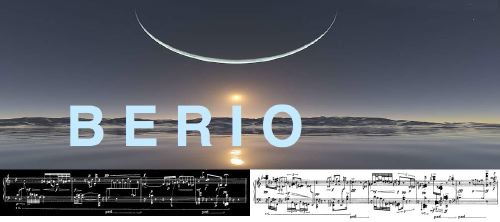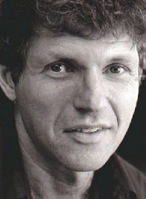
DAY
It’s been said (probably by Robert Craft) that Stravinsky was the last composer whose work could survive a one man recital. At yesterday’s performance of the complete Sequenzas at the Rose Theater, I heard that mantle happily passed by 14 brilliant advocates to Luciano Berio.
In his introductory remarks for yesterday’s performances composer & host Steven Stuckey said that when Berio wrote the Sequenza I for flute in 1958 he didn’t know that he was starting a dynasty. I wonder. By 1958 Berio was already fashioning an approach to composition consciously modeled, down to the smallest detail, on the working methods of 20th century literature’s most voracious and Faustian omnivore, James Joyce. And while Berio himself probably would not have cared much for the notion of “dynasty building”, I think it’s safe to say that he was happy to build and set in motion some very big wheels. Maybe dynasties are what they rolled over.
To push the metaphor a little further perhaps we could say that the Sequenzas, taken as a whole, constitute not a dynasty but a beautiful and (naturally) problematic invisible city. On this occasion each work was dazzlingly interpreted by members of the NYP and a cadre of ferociously gifted special guests. The complete cycle was presented in three highly illuminating groups of 5, 5 and 4, separated by two intermissions. Each segment started with concise & lucid remarks from Steven Stuckey. Each set of Sequenzas was concluded with the representative work for bowed string instrument, culminating in Eric Bartlett’s fearless and riveting performance of Sequenza 14 for cello, which fuses molten modernism with Sri Lankin drumming patterns.
The program opened authoritatively with Sequenza 3 for solo voice, brilliantly performed by Synergy Vocals leader Micaela Haslam. The piece is an all-or-nothing tour de force that Berio wrote for Cathy Berberian (the first of three formidable creative collaborators to whom he was married.) Probably no other work in Berio’s catalog boils down his Joycean obsession with sound-becoming-sense as quickly and concisely as Sequenza 3. The piece is the embodiment of the soul or spirit of all the other Sequenzas and can only come first and be performed with utter conviction (as it was here) in any setting where all the other Sequenzas are to be heard at one go.
Sequenza 3 gave Berio the idea of imbuing all the other Sequenzas with a layer (implied or explicit) of theatricality and Sequenza 5 for trombone was given the full cabaret clown work-up by Sachar Israel, complete with a red rubber nose & a movie-style “back story”. The piece was played with bravura humor & technique but the total effect came of as over worked.
The two most genuinely affecting moments of theater came from performers whose instruments are not normally associated with the gravitas & prestige of their cousins. William Schimmel’s performance of the Sequenza 13 (Chanson) for accordion was truly lovely on every level. He performed as if on a subway platform or in a park, not showily, but, his music balanced on his accordion case, with an air of understated humor, a sly wistfulness that conveyed a bemused understanding that he is creating great art even as he is likely being ignored by all who pass by. Berio takes full advantage of the accordion’s physicality, and one sees & hears the performer squeeze, stretch and bend Berio’s highly individual saturated harmonies, as if a full-blown orchestral work like Formazioni was literally being stuffed into a black box to be taken on a strange journey far from concert halls.
Martin Kuuskmann’s performance of Sequenza 12 for bassoon left me wondering why that instrument has not long since replaced the electric guitar in the bedroom’s of disaffected teenagers around the globe. Playing from memory and holding his instrument without the aid of a support strap he laid down a 22-minute industrial pipeline of sliding, distortion-laden multiphonics that gave me the vivid impression of a Jimi Hendrix guitar solo emerging from one of Anselm Kiefer’s collapsed concrete labyrinths. Using nothing but axe, air & embouchure Kuuskmann sent 40 years of guitar geekery back to the stone age.
Another outstanding contribution to the afternoon was Sherry Sylar’s playing of Sequenza 7 for oboe. Like Sequenza 13, Sequenza 7, even with the extreme technical demands it places on the performer, is one of the more elegiac and haunting of the series. In this work Berio stipulates that a B-natural be sustained just on the threshold of audibility throughout the performance by some external sound source, electronic or acoustic. The aural result should make it sound as if resonance from the oboe’s overtone structure was continuing between the attacks and releases of the notes actually played. Ms Sylar’s blending of her sound with the external sound was seamless & seemingly effortless throughout, beautifully “raising the temperature” of Berio’s long lines ever so slightly. The result captured the gently hallucinatory aura that has always struck me as an important aspect of Berio’s artistic persona.
And I’m very happy to write that the afternoon contained what for me was one of the all-time great moments of hearing Berio’s music played anywhere- Charles Rex’s incandescent rendering of Sequenza 8 for violin. Rex’s performance was a 13-minute taut cable of luminous, buzzing, flickering energy, alternately nervous & lyrical and ultimately profound & very beautiful. He found the perfect balance between Berio’s classical poise & expressionist heat and let me tell you, it was something.
NIGHT
The evening’s performance of Berio’s Sinfonia by the New York Philharmonic under Lorin Maazel at Avery Fisher Hall was a different affair all together. There is no doubt that the NYP makes an amazing, very assured sound, but I have to say that Maazel did not seem very engaged. The work didn’t catch fire and go supernova the way it did with the same vocal ensemble and the Boston Symphony Orchestra under David Robertson a couple years back. I don’t know if this is SOP or not, but Maazel did not do a lot of cueing and in fact very often used his left hand to simply grip the podium railing behind him while beating time with his right.
The first & second movements were securely but very cautiously executed, the first to the point of being under tempo. The orchestra was certainly “there” for Maazel. They just seemed a little under-utilized. The famous “Mahler Movement” grabbed both conductor & orchestra at certain points, although this may have been due as much to the fact that its quote-based material gives all concerned access to a familiar & highly effective gestural repertoire as any real engagement with Berio’s vision. And even here there were problems. The amplification of the vocal ensemble was just slightly too loud. And I really do mean just slightly. The amplification was clean & undistorted but, due to the forward placement of the massive speakers, it easily overwhelmed the orchestra in places where it should have been balanced like any other ensemble within the group. This problem also marred the haunting bursts of soft whispering in the brief fourth movement and the gorgeous “Rose de Sang” soprano solo, flute & piano trio that opens the fifth.
At the risk of pulling my punches, the good news is that it was all still pretty damn good. Also, the hall was full and the work was very warmly received. Along with the one man recital Berio, like Uncle Igor, can also survive a B-level performance from an A-level group. That fact, coupled with a nonetheless genuinely excited full house, are the things that a repertoire standard make. Say “Amen”, somebody.
 The composer Jorge Liderman
The composer Jorge Liderman 